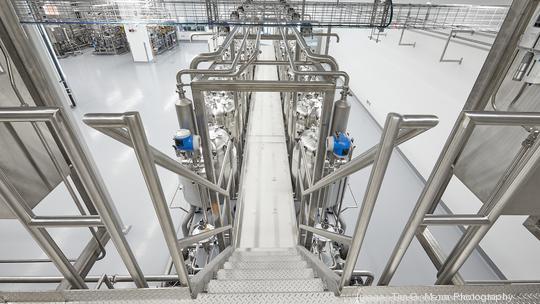
Berkeley cell-cultivated meat giant Upside Foods has raised a $400 million Series C round it claims is the largest in industry history, and will invest a substantial portion of it into building the largest ever production plant of its kind, one capable of producing tens of millions of pounds of meat each year.
Just six months after unveiling a 53,000-square-foot facility in Emeryville it called “the most advanced in the world,” Upside is doubling down on its ambitions to be commercially ready at a massive scale the moment its product clears approval from U.S. regulatory agencies. Upside said it plans to have its products — particularly chicken — available to U.S. consumers later this year, perhaps in restaurants.
The funding round was co-led by global investment company Temasek, headquartered in Singapore, and the sovereign wealth fund of Abu Dhabi, the capital of the United Arab Emirates and brings the company’s valuation to over $1 billion. Since CEO Uma Valeti founded Upside as Memphis Meats in 2015 the startup has raised more than $620 million inclusive of the newest round.
Returning backers in this round included Bill Gates, Cargill, Dentsu Ventures, EDBI (another Singapore-based investor), Kimbal and Christiana Musk, Softbank Vision Fund II, and Tyson Foods. Meanwhile Baillie Gifford, Givaudan, John Doerr, the SALT fund, and Synthesis Capital invested in Upside for the first time.
Beyond the giant new facility, Upside said it will channel the funds into building a supply chain for cell feed components it says will reduce costs and enable greater scale, into research and development of its next generation of products, consumer education, and growing its headcount of more than 170 employees.
The company has declined to share specific production costs but told me late last year it had been driven "multiple orders of magnitude" down from where it was in 2016 at more than $18,000 per pound for chicken, and that Upside sees a clear path to eventual cost parity with conventional meat — although this won't be reflected in the initial prices when it hits the market.
In a press statement Valeti said that his company has reached “a historic inflection point” moving from research and development into commercialization. It’s the transition Upside hired PepsiCo veteran Amy Chen to spearhead as the company’s first ever chief operating officer a little more than a year ago.

Production scaling is happening across the industry and notably among Bay Area startups who lead the development of plant-based and cell-cultivated protein alternatives — more than a dozen are planning or have already begun construction on various kinds of production facilities around the Bay Area alone, I was recently told by a company enlisted for those projects. But none have shared publicly ambitions of this size.
Upside’s upcoming plant will be “more focused on production at scale,” compared with the Emeryville facility, which itself can produce about 50,000 pounds of product per year with eventual designs of more than 400,000 pounds annually, the company said. Like Emeryville, the larger plant will be able to make “any species of meat” in ground and whole cut formats. To date, Upside has made meatballs, duck and various kinds of seafood, but early on will prioritize its planned first commercial product, chicken.
Upside told me it has not fully committed to a location for the facility but that it expects it will be in the U.S., and that given its size it will take longer to build than the approximate one-year construction time for the Emeryville plant.
When asked, the company declined to elaborate on its confidence in possible regulatory approval before year-end.
“We will be ready to commercialize cultivated meat as soon as we get the regulatory green light,” Upside wrote in an emailed statement.
Upside also declined to comment on how the funding would impact its strategy globally given the major investment from a firm headquartered in Singapore, the only country yet to approve commercial sales of cell-cultivated meat when it green-lighted chicken from San Francisco-based Eat Just, Inc. in late 2020.
"Our current focus is on the U.S., but our mission is global, and we plan to expand internationally when it makes strategic sense to do so,” Upside wrote.





